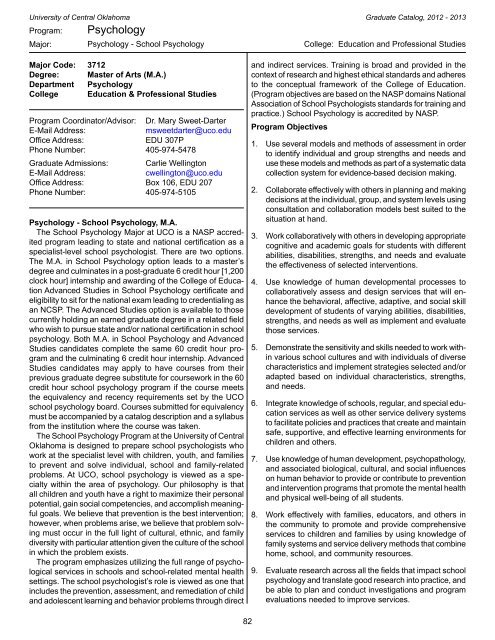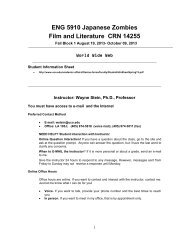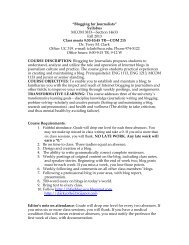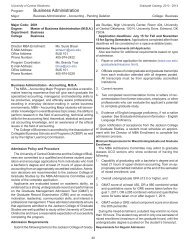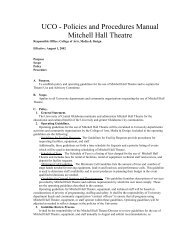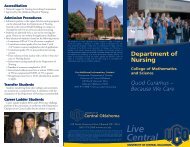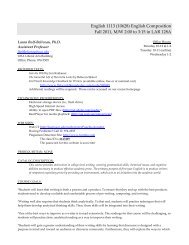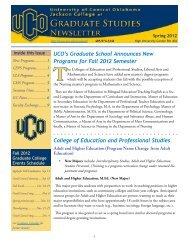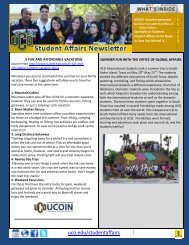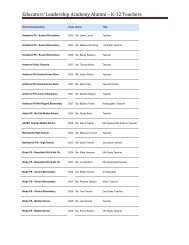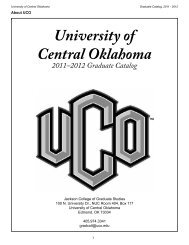Graduate Catalog - University of Central Oklahoma
Graduate Catalog - University of Central Oklahoma
Graduate Catalog - University of Central Oklahoma
Create successful ePaper yourself
Turn your PDF publications into a flip-book with our unique Google optimized e-Paper software.
<strong>University</strong> <strong>of</strong> <strong>Central</strong> <strong>Oklahoma</strong><br />
Program:<br />
Major:<br />
Psychology<br />
Psychology - School Psychology<br />
Major Code: 3712<br />
Degree: Master <strong>of</strong> Arts (M.A.)<br />
Department Psychology<br />
College Education & Pr<strong>of</strong>essional Studies<br />
Program Coordinator/Advisor: Dr. Mary Sweet-Darter<br />
E-Mail Address:<br />
msweetdarter@uco.edu<br />
Office Address:<br />
EDU 307P<br />
Phone Number: 405-974-5478<br />
<strong>Graduate</strong> Admissions: Carlie Wellington<br />
E-Mail Address:<br />
cwellington@uco.edu<br />
Office Address: Box 106, EDU 207<br />
Phone Number: 405-974-5105<br />
Psychology - School Psychology, M.A.<br />
The School Psychology Major at UCO is a NASP accredited<br />
program leading to state and national certification as a<br />
specialist-level school psychologist. There are two options.<br />
The M.A. in School Psychology option leads to a master’s<br />
degree and culminates in a post-graduate 6 credit hour [1,200<br />
clock hour] internship and awarding <strong>of</strong> the College <strong>of</strong> Education<br />
Advanced Studies in School Psychology certificate and<br />
eligibility to sit for the national exam leading to credentialing as<br />
an NCSP. The Advanced Studies option is available to those<br />
currently holding an earned graduate degree in a related field<br />
who wish to pursue state and/or national certification in school<br />
psychology. Both M.A. in School Psychology and Advanced<br />
Studies candidates complete the same 60 credit hour program<br />
and the culminating 6 credit hour internship. Advanced<br />
Studies candidates may apply to have courses from their<br />
previous graduate degree substitute for coursework in the 60<br />
credit hour school psychology program if the course meets<br />
the equivalency and recency requirements set by the UCO<br />
school psychology board. Courses submitted for equivalency<br />
must be accompanied by a catalog description and a syllabus<br />
from the institution where the course was taken.<br />
The School Psychology Program at the <strong>University</strong> <strong>of</strong> <strong>Central</strong><br />
<strong>Oklahoma</strong> is designed to prepare school psychologists who<br />
work at the specialist level with children, youth, and families<br />
to prevent and solve individual, school and family-related<br />
problems. At UCO, school psychology is viewed as a specialty<br />
within the area <strong>of</strong> psychology. Our philosophy is that<br />
all children and youth have a right to maximize their personal<br />
potential, gain social competencies, and accomplish meaningful<br />
goals. We believe that prevention is the best intervention;<br />
however, when problems arise, we believe that problem solving<br />
must occur in the full light <strong>of</strong> cultural, ethnic, and family<br />
diversity with particular attention given the culture <strong>of</strong> the school<br />
in which the problem exists.<br />
The program emphasizes utilizing the full range <strong>of</strong> psychological<br />
services in schools and school-related mental health<br />
settings. The school psychologist’s role is viewed as one that<br />
includes the prevention, assessment, and remediation <strong>of</strong> child<br />
and adolescent learning and behavior problems through direct<br />
<strong>Graduate</strong> <strong>Catalog</strong>, 2012 - 2013<br />
College: Education and Pr<strong>of</strong>essional Studies<br />
and indirect services. Training is broad and provided in the<br />
context <strong>of</strong> research and highest ethical standards and adheres<br />
to the conceptual framework <strong>of</strong> the College <strong>of</strong> Education.<br />
(Program objectives are based on the NASP domains National<br />
Association <strong>of</strong> School Psychologists standards for training and<br />
practice.) School Psychology is accredited by NASP.<br />
Program Objectives<br />
1. Use several models and methods <strong>of</strong> assessment in order<br />
to identify individual and group strengths and needs and<br />
use these models and methods as part <strong>of</strong> a systematic data<br />
collection system for evidence-based decision making.<br />
2. Collaborate effectively with others in planning and making<br />
decisions at the individual, group, and system levels using<br />
consultation and collaboration models best suited to the<br />
situation at hand.<br />
3. Work collaboratively with others in developing appropriate<br />
cognitive and academic goals for students with different<br />
abilities, disabilities, strengths, and needs and evaluate<br />
the effectiveness <strong>of</strong> selected interventions.<br />
4. Use knowledge <strong>of</strong> human developmental processes to<br />
collaboratively assess and design services that will enhance<br />
the behavioral, affective, adaptive, and social skill<br />
development <strong>of</strong> students <strong>of</strong> varying abilities, disabilities,<br />
strengths, and needs as well as implement and evaluate<br />
those services.<br />
5. Demonstrate the sensitivity and skills needed to work within<br />
various school cultures and with individuals <strong>of</strong> diverse<br />
characteristics and implement strategies selected and/or<br />
adapted based on individual characteristics, strengths,<br />
and needs.<br />
6. Integrate knowledge <strong>of</strong> schools, regular, and special education<br />
services as well as other service delivery systems<br />
to facilitate policies and practices that create and maintain<br />
safe, supportive, and effective learning environments for<br />
children and others.<br />
7. Use knowledge <strong>of</strong> human development, psychopathology,<br />
and associated biological, cultural, and social influences<br />
on human behavior to provide or contribute to prevention<br />
and intervention programs that promote the mental health<br />
and physical well-being <strong>of</strong> all students.<br />
8. Work effectively with families, educators, and others in<br />
the community to promote and provide comprehensive<br />
services to children and families by using knowledge <strong>of</strong><br />
family systems and service delivery methods that combine<br />
home, school, and community resources.<br />
9. Evaluate research across all the fields that impact school<br />
psychology and translate good research into practice, and<br />
be able to plan and conduct investigations and program<br />
evaluations needed to improve services.<br />
82


